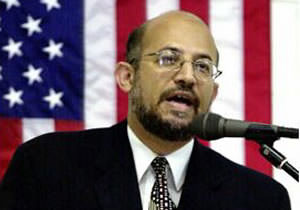Dr. Al-Arian’s Third Strike
The Palestinian activist Dr. Sami Amin Al-Arian, imprisoned for five years despite a jury's failure to return a single guilty verdict against him, has gone on a hunger strike in a Virginia jail.
The Palestinian activist Dr. Sami Amin Al-Arian, imprisoned for five years despite a jury’s failure to return a single guilty verdict against him, has gone on a hunger strike in Northern Neck Regional Jail in Warsaw, Va. Al-Arian, who has abstained from food and water since March 3, began his hunger strike after being informed he would be called before a third grand jury. He has lost 15 pounds and has been moved to the jail’s medical unit.
“A great nation is ultimately defined and judged by its system of justice,” Al-Arian said in a statement released through his family. “When the system is manipulated by the powerful and tolerates abuses against the minorities or the weak members of society, the government not only loses its moral authority and betrays future generations, but will also be condemned by history.”
The hunger strike is the third by the Palestinian activist, who was to have been released in April and deported. During his first hunger strike, which lasted 140 days, he took liquid nutrients and lost 45 pounds. During his hunger strike last year, which lasted 60 days, he drank only water and lost 55 pounds. Al-Arian is a diabetic.
“We are very worried about his health, but we understand why he’s doing this,” said his daughter, Laila Al-Arian. “The U.S. government, through its vindictive and politically motivated behavior, has given our family no other option.”
The recent documentary “USA vs Al-Arian” detailed the absurdity of the show trial held in Florida and the hollowness of the government’s case against Al-Arian. When the film was awarded Best Nordic Documentary at the Nordic Panorama in Finland the jury wrote: “The film shows precisely how a common man becomes a victim of the situation in the contemporary world, where the Big Brother is watching you even when you´re ordering pizza.”
The decision to call Al-Arian before the grand jury was made although Al-Arian had signed a “no-cooperation” agreement. The agreement stipulated that he would not be required to cooperate with the government in other cases. The government’s attempt to force him to testify, despite the agreement, came a month before his scheduled release. It is seen by his lawyers and his family as an effort by the government to keep the activist in jail indefinitely.
Al-Arian endured a six-month show trial in Florida that saw the government’s case collapse. The Justice Department spent an estimated $50 million and several years investigating and prosecuting Al-Arian. The government called 80 witnesses and subjected the jury to hundreds of hours of often absurd phone transcriptions and recordings made over a 10-year period, which the jury dismissed as “gossip.” Out of the 94 charges made against the four defendants, there were no convictions. Of the 17 charges against Al-Arian — including “conspiracy to murder and maim persons abroad” — the jury acquitted him of eight and was hung on the rest. The jurors disagreed on the remaining charges, with 10 of the 12 jurors favoring his full acquittal. Two others in the case, Ghassan Ballut and Sameeh Hammoudeh, were acquitted of all charges, dealing another body blow to the government’s case.
Following the acquittal, a disaster for the government, especially because then-Attorney General John Ashcroft had announced the indictment, prosecutors threatened to retry Al-Arian. The Palestinian professor, under duress, accepted a plea bargain agreement that would spare him a second trial, saying in his agreement that he had helped people associated with Palestinian Islamic Jihad with immigration matters. It was a tepid charge given the high profile of the case. The U.S. Attorney’s Office for the Middle District of Florida and the counter-terrorism section of the Justice Department agreed to recommend to the judge the minimum sentence of 46 months. But U.S. District Judge James S. Moody Jr. sentenced Dr. Al-Arian to the maximum 57 months. In referring to Al-Arian’s contention that he had only raised money for Palestinian Islamic Jihad’s charity for widows and orphans, the judge said acidly to the professor that “your only connection to orphans and widows is that you create them.”
Your support matters…Independent journalism is under threat and overshadowed by heavily funded mainstream media.
You can help level the playing field. Become a member.
Your tax-deductible contribution keeps us digging beneath the headlines to give you thought-provoking, investigative reporting and analysis that unearths what's really happening- without compromise.
Give today to support our courageous, independent journalists.






You need to be a supporter to comment.
There are currently no responses to this article.
Be the first to respond.